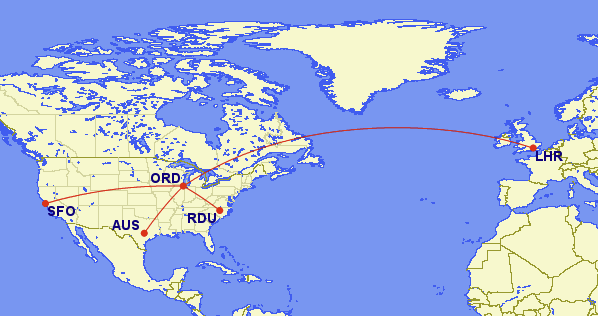I've written before about urban highways, never favorably. Ploughing massive roads through dense urban areas has done incalculable damage to North American cities that tearing them down or burying them has only just started to fix—but usually with an order of magnitude more cost than their initial construction.
Today I got an innocent little email listing houses for sale around Chicago, both because I'm interested to see what's out there, and also because I've been too lazy to turn it off since I last moved. But one house stood out today: a beautiful, 4-bedroom Victorian built in 1898 with a lovely wraparound porch, tons of light and air, steps from everything.
I would love to live in a house just like this. In fact, there are similar houses near me, with price tags around $2-$3 million.
This stately lady in Old Irving Park can be yours for only $750,000. And that jaw-dropping difference in value is entirely due to its location.
You see, even though this house is steps from everything—only four blocks to the Metra, three blocks to the El, close to the shops in the historic commercial corridor along Elston—it's also just 200 meters from the 10-lane I-90/94 expressway:

I mean, holy hell. Getting to the El or to the Metra stations at Mayfair or Irving Park requires crossing all those lanes of traffic. I've done it; the Montrose and Irving Park bridges are soul-crushing for pedestrians. Worse, the Keeler underpass (which you'd take to the Irving Park station) requires you to cross two entrance and exit ramps on either side of a half-block-long underpass.
I'm not even going to talk about how loud the 10 lanes of traffic must be.
In short, this beautiful house, "the second built in the area," can't get anywhere near the price it would had the city not destroyed the neighborhood in the 1950s.
Sad.
In other news:
And finally, a glimmer of hope that the 10-year project to build one damn railroad station near my house might finally finish in the next few weeks.
As we in Chicago enjoy (?) the 12th consecutive day with above-normal temperatures, and look forward to another 10 at least, it turns out ExxonMobil's own scientists predicted global temperature rises 40 years ago:
In the late 1970s, scientists at Exxon fitted one of the company’s supertankers with state-of-the-art equipment to measure carbon dioxide in the ocean and in the air, an early example of substantial research the oil giant conducted into the science of climate change.
A new study published Thursday in the journal Science found that over the next decades, Exxon’s scientists made remarkably accurate projections of just how much burning fossil fuels would warm the planet. Their projections were as accurate, and sometimes even more so, as those of independent academic and government models.
Yet for years, the oil giant publicly cast doubt on climate science, and cautioned against any drastic move away from burning fossil fuels, the main driver of climate change. Exxon also ran a public relations program — including ads that ran in The New York Times — emphasizing uncertainties in the scientific research on global warming.
In the new study, Geoffrey Supran and Naomi Oreskes of Harvard, and Stefan Rahmstorf of the Potsdam Institute, carried out a quantitative analysis of global warming projections made or recorded by Exxon scientists between 1977 and 2003.
Those records, which include internal memos and peer-reviewed papers published with outside academic researchers, make up the largest public collection of global warming projections recorded by a single company, the authors said.
Overall, Exxon’s global warming projections closely tracked subsequent temperature increases of around 0.2 degrees Celsius of global warming per decade, the study found.
The company’s scientists, in fact, excluded the possibility that human-caused global warming was not occurring, the researchers found.
And yet, people still believe businesses that tout research favorable to their own interests. Does this remind you of anything?
I'm on hold with my bank trying to sort out a transaction they seem to have deleted. I've also just sorted through a hundred or so stories in our project backlog, so while I'm mulling over the next 6 months of product development, I will read these:
And my bank's customer service finally got back to me with the sad news that the thing I wanted them to fix was, and we are so sorry, it turns out, your fault. Fie.
We've now got two full years between us and 2020, and it does look like 2022 got mostly back to normal.
- The Daily Parker got 487 posts in 2022, 51 fewer than in 2021 and 25 below median. As usual, I posted the most in January (46) and fewest in November (37), creating a very tight statistical distribution with a standard deviation of 3.45. In other words: posting was pretty consistent month to month, but down overall from previous years.
- I flew 10 segments and 16,138 flight miles in 2022, low for the 21st century but about average for my lifetime.

- Once again, I visited only one other country (the UK, of course), but 8 other states: North Carolina, Indiana, Kentucky, Ohio, Wisconsin, California, Texas, and Michigan. In 2023, I plan to visit a bunch of new countries, but we'll see. Altogether I spent 107 hours traveling.
- I walked Cassie for a little more than 369 hours, somewhat fewer than in 2021 (422) but still an average of over an hour a day. It's about half as much as she wanted.
- I got 4,537,290 steps for 3,693 km of walking, a little below 2021 but about average overall. I only hit my step goal 327 times, though, due to no longer getting worked up about missing it in bad weather. I still averaged 12,393 a day, which doesn't suck.
- I drove 5,925 km on 144 L of gasoline, for an average of 2.4 L/100 km (96.4 MPG). The last four months of the year I used only 4 L of gas over 1,179 km, meaning I'm heading into 2023 with a nearly-full tank I last filled on August 21st. I do love living in the city!
- I worked 1,894 hours for my real job, including 1,260 from home and 580 in the office. The remainder went to conferences and work events. Plus, I spent 103 hours commuting, all of it by public transit (see above re: gasoline use).
- My commitment to the Apollo Chorus went up by a third this year, with 318 hours overall split between rehearsing and performing (220 hours) and my responsibilities as president (98 hours). Last year I spent 57 hours on rehearsals and performances and 71 hours on board stuff, but the first half of 2021 we were still virtual. In the last full year before the pandemic, 2019, I spent 200 hours overall (27 for the Board, 144 on rehearsals and performances, 29 for the fundraiser), so we really did do more this year than in years past.
- Finally, reading stayed the same, with 27 books started (cf. 28 in 2021) and 24 finished (cf. 23 in 2021)—both numbers exactly at median for me. But I watched a whopping (for me) 56 movies and 50 TV show seasons or miniseries. Yeek.
So, yeah, except for the permanent, post-pandemic shift to working from home 2/3 of the time, 2022 really did get back to normal in most ways. I'll take it. Here's to continued normal in 2023!
New York City has a huge online map of every tree they manage, and they just updated their UI:
Near the Tennis House in Brooklyn’s Prospect Park grows a magnificent white oak that stands out for its impressive stature, with a trunk that’s nearly four feet wide. But the massive tree does more than leave visitors in awe. It also provides a slew of ecological benefits, absorbing some 25,000 tons of carbon dioxide and intercepting nearly 9,000 gallons of stormwater each year, according to city data. It also removes pollutants from the air and help the the city conserve enough energy to power a one- or two-bedroom apartment for roughly two months.
In economic terms, just that one tree contributes more than $550 each year.
Such fine-grained information is now available for more than 150,000 trees in parks managed by NYC Parks and Recreation via a new living tree guide from the agency. The New York City Tree Map, launched Thursday, is an expansion of the city’s existing street tree map, which since 2016 has enabled New Yorkers to get up close and personal with the 650,000-some trees that line their neighborhood sidewalks.
Hey, Chicago: when do we get one of these?
I posted this morning about the decline in craft brewing that seems to have started, thanks to market saturation and the pandemic. Two other things have reached the ends of their runs as well, and both have deep Chicago connections.
First, Boeing this week rolled out its last 747 airplane. The 54-year-old design has come a long way, to the point where the 747-8i that left the Everett, Wash., factory on Tuesday has 150% the carrying capacity of the first 747-100 produced in 1968 (333 tonnes vs. 458 tonnes—just over 1 million pounds).
Second, the Lincoln Park Zoo plans to remove what could be the oldest tree in Chicago in the coming weeks. The bur oak, on the Zoo's south lawn by the white-cheeked gibbons, has grown in the spot for between 250 and 300 years, making it about as old as Händel's Messiah. The tree has a 117-cm diameter trunk and stands 13.7 meters tall. (Two other trees—an oak in Norwood Park and another bur oak by the University of Chicago—may be older.)
Time and chance happeneth to them all.
In the last couple of days, I've observed a phenomenon I don't remember seeing in years past, perhaps because the city has a different mix of tree species around my new place. It looks like all the silver maples in Ravenswood dropped their leaves just in the past 72 hours:

All the other trees in the neighborhood took their time over the warm, dry fall we've had, but the silver maples hung on like a 6-year-old holding his breath.
Researching this post, I learned that the city requires property owners to limit Norway and silver maples to 5% of the total population of trees they plant. Maples account for 38% of Chicago's trees (as of 2013), so the city recommends planting London planetrees, Chicago Blues black locusts, and Chicagoland hackberries, among a few others.
It shouldn't have surprised me that Chicago itself has become a specific ecological niche with its own local plant species. I can't wait to see rattus norvegicus chicagoensis lurking in my alley...but I'd bet they're out there.
Chicago's heavy-rail commuter district, Metra, started cancelling train service that would extend past the midnight-Friday start time of the planned nationwide rail strike. Well, taking the El to work instead of Metra adds about 9 minutes to my commute, so I'll have to deal with that on Friday, I suppose. Except that commuter rail shutdowns don't even start to illustrate how bad this strike could turn out for the US economy:
[A strike] would cause immediate problems for manufacturers, says Lee Sanders with the American Bakers Association. This is nationwide. And a broad range of manufacturers who get parts, packaging and raw material delivered by rail would be effected.
"If we don't get the ingredients that we need to our plants, we won't be able to make the products that we need to get our wholesome products to the consumers," Sanders says.
So, empty shelves are a possibility. Farmers are worried too about shipping grain. Dangerous chemicals have already stopped moving. Especially valuable goods are next, and passengers are getting stranded too.
Don't forget about coal, either. About 22% of US electricity comes from coal-fired plants, including 30% of Illinois' power. (As it turns out, Illinois has a higher proportion of nuclear power—about 54% of output—than any other state, which gives us a bit more reliability.)
I have a lot of sympathy for the engineers and conductors, whose schedules seem even less predictable than even fast-food workers. I hope the railroads agree to better scheduling and time-off provisions before Friday, or we're going to have a major economic disruption while we already have high inflation. Not a good combination.
A farmer in northeastern Nevada has capitulated to the "highly skilled environmental engineers" beavering away on his property:
Last year, when Nevada suffered one of the worst droughts on record, beaver pools kept his cattle with enough water. When rains came strangely hard and fast, the vast network of dams slowed a torrent of water raging down the mountain, protecting his hay crop. And with the beavers’ help, creeks have widened into wetlands that run through the sagebrush desert, cleaning water, birthing new meadows and creating a buffer against wildfires.
True, beavers can be complicated partners. They’re wild, swimming rodents the size of basset hounds with an obsession for building dams. When conflicts arise, and they probably will, you can’t talk it out.
“We need to get beavers back to work,” Wade Crowfoot, California’s secretary of natural resources, said in a webinar this year. “Full employment for beavers.” (Beaver believers like to note that the animals work for free.)
Further east, where water and beavers are more plentiful, the job market isn’t as hot. But there are projects. In Maryland, groups are trying to lure beavers to help clean the water that flows into Chesapeake Bay. In Wisconsin, one study found that beavers could substantially reduce flooding in some of the most vulnerable areas of Milwaukee County.
And if something about the beavers' work ethic is gnawing away at you, you can always lodge a complaint.